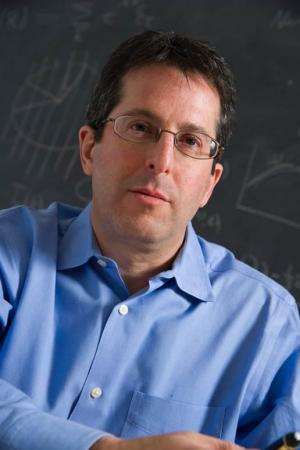Baltimore astrophysicist Marc Kamionkowski wins 2015 Dannie Heineman Prize

The American Astronomical Society (AAS) and the American Institute of Physics (AIP) announced today that Johns Hopkins University's Marc Kamionkowski is a winner of the 2015 Dannie Heineman Prize for Astrophysics, one of the top prizes in the field which is awarded annually to outstanding mid-career scientists.
The award carries a cash prize of $10,000 to be split between Kamionkowski and his co-winner, David Spergel of Princeton University. For information on his co-winner see: http://www.aip.org/news/2015/new-jersey-astrophysicist-david-spergel-wins-2015-dannie-heineman-prize.
The two researchers are receiving the award "for their outstanding contributions to the investigation of the fluctuations of the cosmic microwave background, which have led to major breakthroughs in our understanding of the universe," according to the selection committee.
"Marc Kamionkowski's groundbreaking theoretical work on cosmic background radiation has helped drive experimental progress in the field—work that has forever changed how we view the universe," said Fred Dylla, AIP executive director and CEO.
"It's a great honor for me....If I look at the list of prior winners, lots of astrophysicists whose work I have admired over the years are there," said Kamionkowski. "It's also an honor to share it with David Spergel."
"Mark and David have taught us how to read the subtle bumps and swirls in our exquisite image of the early universe to reveal what happened in the moments of creation," said David J. Helfand, who is President of Quest University Canada and Past President of AAS.
Kamionkowski received his Ph.D. from the University of Chicago in 1991 and did his postdoctoral work at the Institute for Advanced Study in Princeton, New Jersey. He then worked as an assistant professor at Columbia University before moving to Caltech in 1999. In 2011, he joined the faculty at Johns Hopkins University. He has received numerous awards for his work, including the E.O. Lawrence Award for Physics in 2006, and was named a Simons Foundation Investigator in 2014.
Kamionkowski began his work on cosmic background radiation—leftover thermal energy from the Big Bang—in the 1990s, when NASA's Cosmic Background Explorer was beginning to announce results. "It seemed like a promising area for investigation," he said. He co-wrote several papers with Spergel proposing a way to determine the spatial geometry of the universe using temperature maps of the cosmic microwave background.
"I think that our work helped provide the motivation for these experiments," he said. "By the beginning of the next decade, we were already starting to see measurements like those we had envisioned."
Later, Kamionkowski studied the polarization of the cosmic microwave background, again spurring experimentalists to measure this phenomenon. His work has advanced the field of precision cosmology, which in recent years has provided data on the age, shape and composition of the universe.
"One of the goals of my research has been to think of ways we can use cosmic microwave background and other cosmological measurements to learn about the very early universe or physical phenomenon that might occur in a later universe," he said.
Provided by American Institute of Physics